| Srl | Item |
| 1 |
ID:
097699
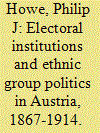

|
|
|
|
|
| Publication |
2010.
|
| Summary/Abstract |
This article tests ethnic exceptionalist and non-exceptionalist theories of political behavior by analyzing parliamentary elections in the Western half of the Austro-Hungarian Monarchy. Austria's gradual implementation of universal manhood suffrage before World War I provides an excellent opportunity to assess the effects of ethnic divisions in a democratizing country. Examining the interaction between political institutions and ethnic divisions affirms that voters' choices and the resulting party system were no more likely to reflect ethnic than other societal cleavages.
|
|
|
|
|
|
|
|
|
|
|
|
|
|
|
|
| 2 |
ID:
111503
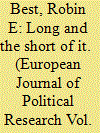

|
|
|
|
|
| Publication |
2012.
|
| Summary/Abstract |
While institutional theories of party system size are usually examined cross-nationally, there is ample reason to expect that changes in electoral institutions will affect party system size within countries as well. Although some of this effect may occur immediately, most of the effects are likely to be realised over time and across subsequent elections. A series of error-correction models examine the short- and long-term effects of changes in electoral institutions on party system size. The results indicate that changes in electoral institutions do produce the expected effects on party system size, and that these effects occur mostly over the long term.
|
|
|
|
|
|
|
|
|
|
|
|
|
|
|
|
| 3 |
ID:
092334
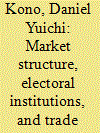

|
|
|
|
|
| Publication |
2009.
|
| Summary/Abstract |
The view that intra-industry trade is politically easier to liberalize than inter-industry trade is widely held and potentially explains key features of the global trading system. This view, however, rests on weak theoretical and empirical foundations. I argue that intra-industry trade can in fact lead to higher protection, but only where electoral institutions privilege narrow protectionist interests. I support this hypothesis with an analysis of trade barriers in 4,400 sectors in 65 countries and an analysis of lobbying in the US. My results imply that scholars should stop invoking intra-industry trade as an explanation for low trade barriers in wealthy countries and advanced manufacturing sectors. They also have important implications for the more general relationship between political institutions, collective action, and policy outcomes.
|
|
|
|
|
|
|
|
|
|
|
|
|
|
|
|
| 4 |
ID:
120875
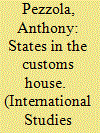

|
|
|
|
|
| Publication |
2013.
|
| Summary/Abstract |
How constituent interests influence policy outcomes depends on a country's political institutions. The examination of Mexican trade policy in two different institutional settings demonstrates that electoral systems influence who receives preferential treatment by politicians. Specifically, when electoral institutions make politicians beholden to territorially specific constituencies, the political clout of an industry stems from its importance within the political jurisdictions that it inhabits. The centrifugal influence of Mexican electoral reforms and the emergence of divided government increased the political salience of subnational economic interests. Where political clout once stemmed from an industry's importance in the national economy, the political clout of an industry now depends heavily on its importance to subnational economies.
|
|
|
|
|
|
|
|
|
|
|
|
|
|
|
|
| 5 |
ID:
114862
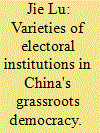

|
|
|
|
|
| Publication |
2012.
|
| Summary/Abstract |
Grassroots democracy has been practised in rural China for more than a decade. However, despite the existence of a mountain of evidence, evaluations of the quality of China's rural grassroots democracy, particularly electoral institutions, have unfortunately been inconclusive, due to primary reliance on case studies and local surveys. Moreover, the lack of comparable data over time prohibits effective studies on the evolution of grassroots democracy in Chinese villages. This article tries to provide some systematic information on how village committee elections are practised and have evolved in China, using two village surveys based on comparable national probability samples, implemented in 2002 and 2005 respectively. It further explores the validity of some key theories in contemporary literature on the uneven implementation of village committee elections in China with the help of an integrated regression model.
|
|
|
|
|
|
|
|
|
|
|
|
|
|
|
|